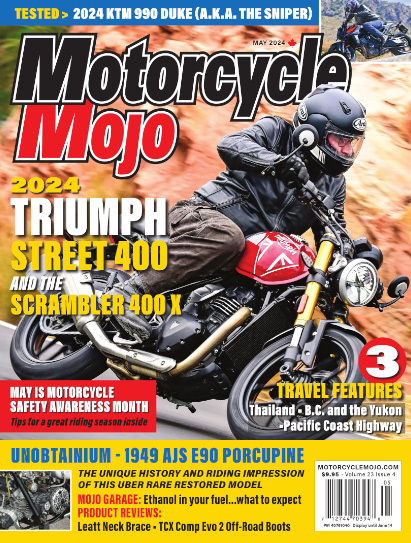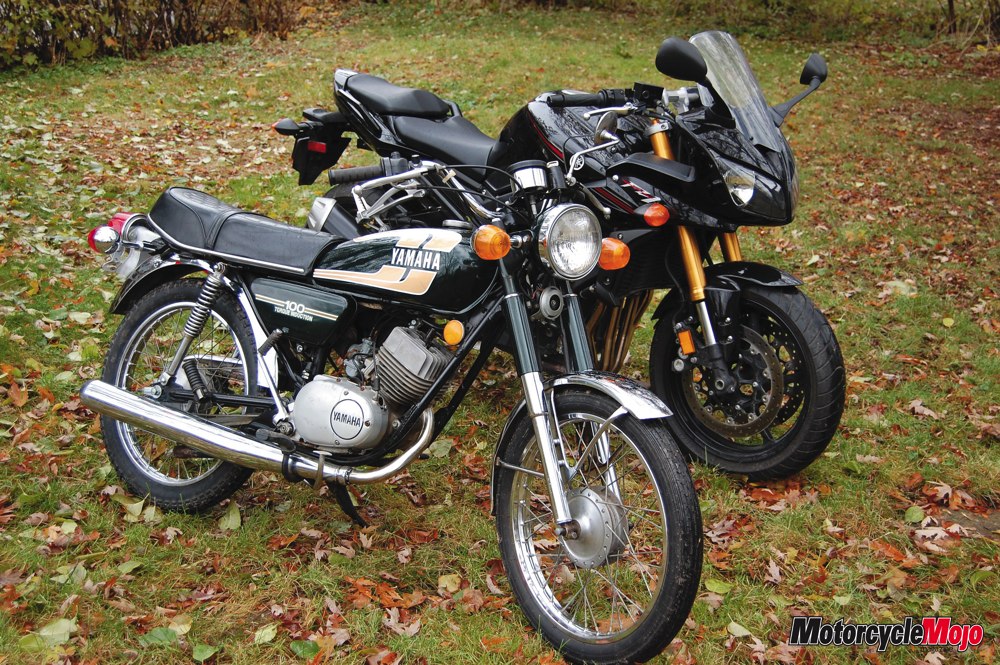I love all bikes, but I have a special fondness for old ones that need a good home. I can’t think of a time in my life when I wasn’t looking for my next bike. Since having a ride on Gordon Raflaub’s mini trail in 1967, I’ve been hooked. At age eight I acquired my first bike after a year of saving birthday money, wheeling and dealing anything I could sell, including a foray into exotic pet sales (salamanders). After forty years of buying used bikes, you would think I’d have had enough, but no, I still search.
A few days ago I brought another bike home. Man, what a beauty. I search on bulletin boards at the grocery store, at bike shops, chat to everyone I know, and many I don’t know. I also seek out the buy and sell sites on-line. I found my latest bike on-line. The ad showed a picture of a bike I didn’t recognize so I read on.
“1975 Yamaha RS100B. Near mint condition, 12,000 miles used to be a Shriner’s parade bike”.
The seller is a nice guy named Ian in Whitby, Ontario. His ad simply stated “Best Offer”. I didn’t want to offend but at the same time, I didn’t want to offer too much. I explained to Ian why I wanted the bike. My plan is to put it on the road and use it for short errands around town. It will also be on display at our rider training school under a sign that will say “What kind of Yamaha were you?”. It can keep a few of my vintage dirt bikes company. I offered $1300.00 hoping that amount was acceptable. I was very excited the day I pulled up outside Ian’s home and saw the little RS waiting for me. I remember the same exhilaration forty years ago when looking for my first bike. I wanted to buy the first one that smelled like gas, but my father (who rode in England) was more cautious and patient. He ended up driving me all over the place until we found a bike that my budget could afford and our technical prowess could fix.
Part of the fun for me is to scratch out a feasibility plan. It’s often on napkins where I add up what funds I have (often few), what I could sell in order to get cash and what I could borrow towards the current acquisition. I have owned over one hundred bikes, but often have to sell them off to finance the next dream bike. Imagine having the resources of Jay Leno to finance our bike passion. That would equate into a big barn, full of cool bikes.
This latest bike I bought, the RS100B, is really neat! It’s a street legal, 100 cc two-stroke and the RS means Road Single-cylinder. For its age, the little Yamaha really is in near mint condition. Ian put a new fuel petcock and a rear tire on it and pulled the wheels apart to check the brakes. I have ordered a few parts for it such as a new front fender. The Shriner who rode it in parades had a big chicken mounted on the front fender. Unfortunately, I didn’t get the chicken. To certify the bike I’ll have to get all the lights working, maybe a front tire and that’s it. Insurance should be cheap because it’s small and I’m old.
Memories of Two-Stroke
Two-stroke street bikes were all the rage in 1975 when I was sixteen and I rode my tired CB350 to school and parked amongst nine other bikes. Eight of the ten bikes were two-strokes. There was a Suzuki 185 dual sport, a 380 (Ram Air), a Kawasaki 400 triple, a gorgeous orange 500 H1 and a few Yamaha RDs (Road Dual-cylinder). It was a smoky scene when we all fired up and left school.
These days, you can’t buy street legal two-strokes except for some scooters and a few dual sports. Our sport has evolved and perfected the four-stroke. Call me nostalgic, or a romantic fool, but I was really drawn to owning a bike like my high school buddies used to zip around on. Many of our staff and some of my friends couldn’t understand why I would buy such an old bike. Life was simpler in 1975. I hung around school and bike shops with my riding friends, talked bikes and drooled over the new models. My responsibilities were few. I had some chores around home to do, a part-time job at the grocery store, some homework and a great network of riding buddies. In those days, food magically appeared in the fridge and then onto the table. I didn’t pay rent, I had no mortgage or car insurance (I was on pappy’s truck policy) or any other living expenses. Life was great! I only needed gas for whatever I was riding or driving and a bit of spending money, and that was it. Simple and fun!
Not all of my biking memories of circa 1975 are good, though. I will never forget learning that one of my riding pals from high school didn’t make it home one night. I had known Brian Edwards as a dirt rider first. I met him at a local riding area and asked him what a Hodaka was? He owned a Combat Wombat Hodaka (a really cool little dirt bike with a chrome tank). We later ended up at the same high school where Brian rode a Yamaha RD250. None of us had any formal training; it didn’t exist as far as we knew. Brian got his license the same way I did. We showed the MTO licence examiner (Mr. Tucker) that we could push our bike around some pylons, had to kick start it and then ride a figure eight around some buildings. You could do the whole test at first gear speed in ten minutes. In that era there was no collision avoidance test or cornering at speed assessment on the skills test. Then you were let loose on the streets and highways.
Understanding Counter-Steering
If my memory serves me correctly of what friends told me at the time, Brian had his oldest brother on the back of his bike. They were entering the highway on a ramp and tragically fell under a transport truck. Perhaps Brian’s off-road experience didn’t prepare him for higher speed cornering on pavement? As most of you will know, a motorcycle at speed does not steer like a car. On an on-ramp curving to the right, Brian should have been pushing on the right handlebar. The slight push on the bar in the direction you want to go will initiate a lean as the front wheel out-tracks from the rear, push right to go right. If you accelerate while in the curve, then you have to push harder on the right bar. This keeps the bike in the curve as acceleration will cause the bike to stand up and move to the left. Maybe this is what happened to Brian? If he accelerated hard without the required counter-steering (pushing right), then maybe his bike stood up and veered left into the path of the truck. Or, he could have simply merged without shoulder checking. Brian’s loss was a horrible realization to me that our hold on the road, and life, was tentative and fragile. A loss of a riding buddy, as many of you sadly know, is very tough. It inspired me to get more training that eventually led to a job teaching others how to ride safely.
At the two-day ‘Get your street bike license courses’ across Canada there is a cornering lesson. The new rider should learn three critical skills. A) How to push steer a motorcycle in a curve B) What happens when you accelerate in a curve, and C) What happens when you decelerate and/or brake in a curve.
Now you may be scratching your head when talk turns to counter-steering, opposite steering or push steering. Don’t get hung up on the lingo or the physics. If you can corner at speed and change speeds now, then don’t worry about it. It might be nice to read up on counter-steering to understand it, but it’s not really necessary. If you are a new rider, or know someone joining our sport, make sure there is a rider-training programme in your, or his or her future. The collision avoidance and cornering lessons alone are worth the price of the course.
Too many riders crash on corners by over-riding their abilities. They go too fast into a corner, often panic and get on the brakes hard. That can have dire consequences when the bike is leaned over. It’s very hard to panic brake while cornering as the bike usually wants to stand up and then goes straight off the corner. Or a wheel might lock up and then slides out. It’s better to keep the speed down on entering a corner, look where you want to go (the exit), and smoothly, accelerate while push steering to keep the bike turning to where you want it to go. With good tires and a modest skill level, you are better to push harder on the lower handlebar when you feel you can’t make a corner. Students are always amazed at how far their bike will lean over while cornering smoothly. I have run out of room on some decreasing radius corners that surprised me. My initial instinct was to scream and then jump on the brakes, but I resisted. Look, push and be smooth with the throttle. Don’t suddenly chop the throttle, or accelerate hard while cornering since the weight transfer and abrupt power delivery change could be too much for the available traction. Cornering smoothly is one of the things I love best about street bikes.
All this talk of riding in late November has me itching to go for a ride. The FZ1 is winterized, but maybe I’ll get the little Yamaha 100 certified tomorrow and go for a ride. I can’t stop by the old bike shops (they are all long gone) but my old high school is just up the street. Ya, a nice ride to the malt shop and then stop by the school and see what’s kickin’! My eldest son is now in grade ten. He would just die if his almost 50-year-old Dad showed up on a 33-year-old two-stroke. The only thing worse would be if I could find the chicken that was strapped on the front when it was a Shriner bike.














